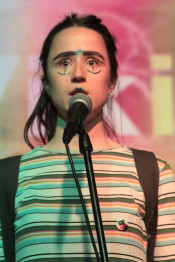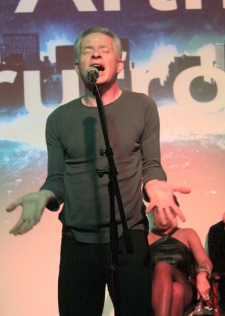Anti-slam, London, 2016

“Welcome to the worst night of your lives!” That was the enticing introduction from host Dan Simpson at the start of the Anti Slam Apocalypse, a grand UK final of anti-slammers from around the country. The packed audience, many of them already in the know about anti-slams, whooped and hollered their approval.
Co-host Paula Varjack explained things a little more: “We reward failure. We’re talking poetry so awful, so cringeworthy, it becomes genius.” Things became even more surreal when it emerged that they had Arts Council funding to put on this fandango in Hackney.
As an anti-slam virgin – I know, but I’ve led a sheltered life – I was sceptical at first, partly because the show was starting fashionably late, although that may have been for perfectly good logistical reasons. But I had miles to go before I slept that night, south of the river and out into the Surrey shires, and was already worrying about the last train. Yet my initial curmudgeonliness was soon dissipated amid the general hysteria, and later, as I tottered out of the Hackney Picturehouse, the almost blasphemous thought occurred – whisper it, who dares – that this kind of thing is a bit more fun than your average poetry slam.
Simpson and Varjack warmed up the audience with a “found” poem taken from a Guardian article about the bad influence of slam poetry. They turned it into a poem by inserting line breaks, significant pauses, and lots of heavy breathing – which is a perfectly acceptable performance poetry technique, now you come to think of it.
A “sacrificial poet”, Rufus Spatchcock, did a turn to give the panel of three judges – whose barbed, bitter or bewildered comments provided great entertainment during the evening – a chance to practise their scoring, in which the lowest marks signify both disapproval and approval, and mean success, if you get what I mean. A firm but fair Teutonic scorer and timekeeper encouraged the audience to shout out “We’ve had enough!” at his given signal.

Next was London anti-slam champ Camilla, pictured left, who was obsessed with the state of the linen in hotel rooms, and mattresses that were “saturated in sex syrup”. Nice. Manchester’s Joy France, introduced as a “grande dame”, tried to restore matters to an even keel by insisting that “when I say knob it will always mean door handle”. She couldn’t keep this “proper poetry” stance up, however, eventually confessing that she had the hots for Pam Ayres: “She stirs my loins when I stir my jam.”

Viking No Name ended her act by carefully pouring a glass of water over her head, for no obvious reason – “a lot of Philip Larkin in that one”, was the verdict of one member of the audience, mystifyingly. J Arthur Prufrock’s work included these evocative lines – “It is a steam train, whistling through the myriad shards of your diaspora” – which meant a lot to me.
The contestants were completed by Amelia Star from Sheffield, who Shakespearean influences were obvious in the rhyming of “Horatio” with “fellatio” – her later “hymen” and "Gloria Steinem” were equally apposite, I felt – and Oxford’s Vera Chok, who unwrapped a bag-covered assistant, and had to deal with a persistent heckler. I wasn't sure whether he was part of the act, but maybe that was the idea.

It wasn’t that I’d had enough. But at this tense moment, I had to leave to catch the last semi-fast train of the evening to West Byfleet from Waterloo. It was a shame, as I was also interested to see how things would develop with the heckler, who seemed to be just getting into his stride.
What can you compare it with? Literature’s Bad Sex awards? Maybe, but these poets are consciously trying to be awful, and are rather good at it. If they occasionally remind you of inappropriate outpourings you have heard at an open mic night, that’s because they mean to – only these sly critiques are more focused, better at being bad.
PS The anti slam was won by J Arthur Prufrock, aka Stewart Taylor, pictured above. #TeamTrending (Sara Hirsch and Ben Fagan) came second, and Vera Chock 100% Chinese Chok, to give her full title, was third. Dan Simpson said: "We fired the jury before the final round, and the audience cheered for the winner - it was overwhelmingly Stewart!."
PHOTOGRAPHS: GREG FREEMAN




